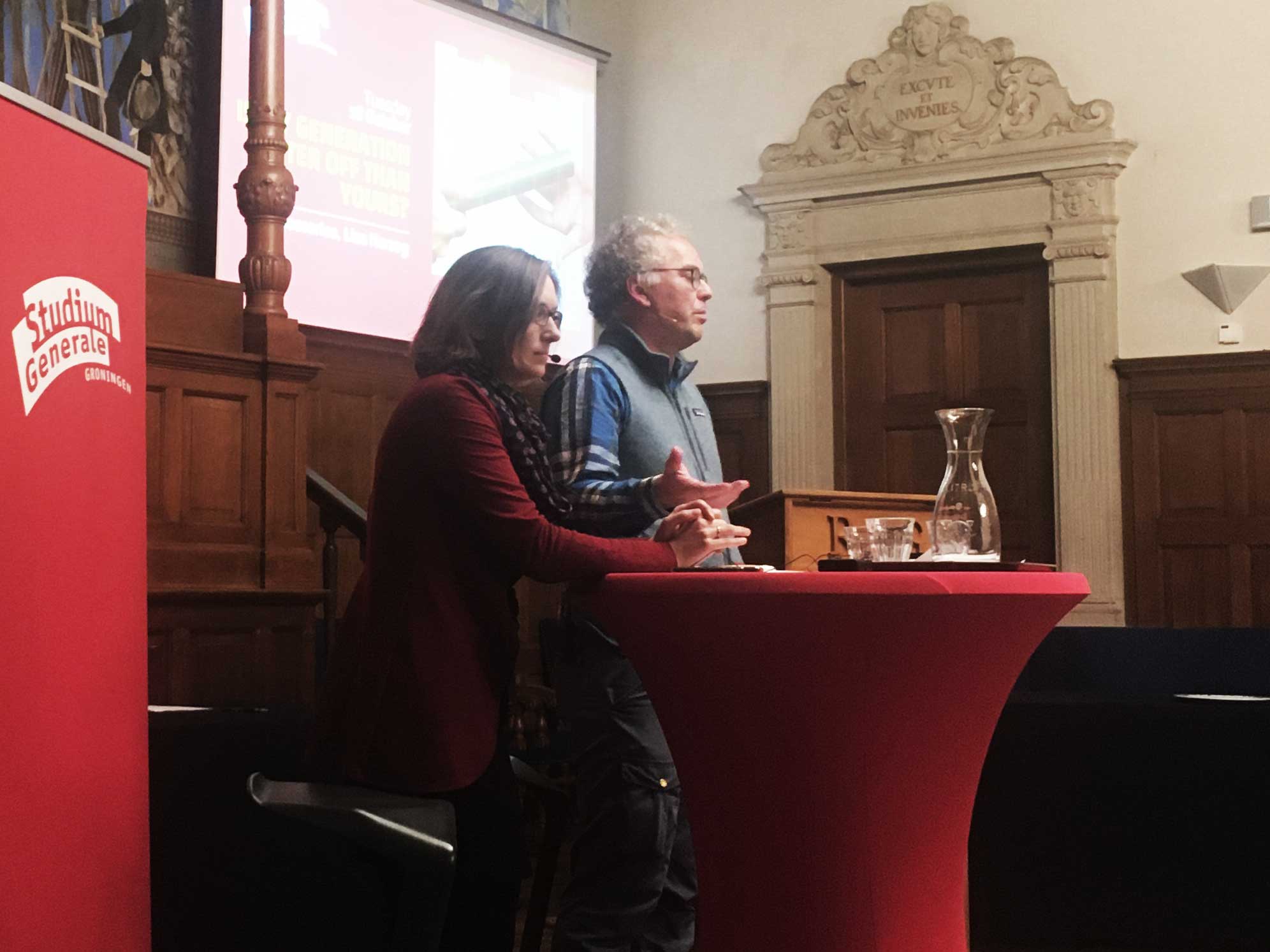
Generational Differences
Is my generation better off than yours? And why should we care whether it is or isn't? Different generations came together in the Aula of the Academy Building to talk about generational thinking on October 18 with Axel Gosseries and Lisa Herzog. We started off with an inventory of the generations represented in the room: Generation Y (born between 1980 – 1995, better known as Millennials) and Generation Z (born between 1996 – 2012, often shortened as Gen Z) accounted for the majority, there were some of Generation X (born between 1966 -1979) present and a few Baby-Boomers (1946 – 1965) too. Did anyone think their generation was better off than the one before? Only a few: mostly people that belong to the generation of Baby-Boomers thought they were better off than the generation before.
Indeed, it is tempting to believe the narrative of boomers being better off than their parents, who grew up during an economic crisis and had to go through the experience of World War II. But how can we tell if Baby-Boomers are really having an easier time than the generation of their parents? And are generational differences of any significance at all? How do we relate to past generations? And what sacrifices are we willing to make to leave the world a better place for the future ones?
Reciprocity, Sufficiency and Sacrifice
Should we care about generational differences? Gosseries provides us with a few different points of view when it comes to intergenerational justice. We can think of it as giving back to future generations what we inherited from the ones before (indirect reciprocity). Or we might only feel the need to provide the basics for future generations (sufficiency). In this case we might want to define and also measure what would be sufficient, but we wouldn’t seek to improve things for the future generation, or not even to preserve it in a condition as good as the current one. Should we feel the need to make certain sacrifices to make the world a better place for our children, or should they accept the decisions we make for our own benefit? We might live with the consequences from bad calls from former generations, like with climate change. We might fight injustice in a war, and sacrifice a generation. But when is this sacrifice justified? How would we know?
Living happily in a crap world
Lisa Herzog started off her conversation with Gosseries by referring to the song Allentown by Billy Joel. A song from 1982 that deals with the expectations of different generations and the fear that things are going downhill. Apparently, the feeling that we might not be better off in the future is not that new. And zooming in on the lyric phrase “Every child had a pretty good shot. To get at least as far as their old man got”, Herzorg brings the following issue to the table: didn’t earlier generations feel quite lucky to be able to maintain the level of well-being that their parents had? Did the expectation to be better off than your parents derive from the idea of continuous progress in western society?
Axel Gosseries agrees that expectations are crucial. When we speak of ‘being better off’; what does this even mean? You can look at objectives, such as income, education, housing opportunities, biodiversity, etcetera. But that doesn’t provide the full image: the younger generation might have had more education, but the level of education might be of less value in today’s society. Another example that Gosseries makes is the fact that people live more in isolation nowadays, but the level of feeling lonely didn’t increase.
So, should we also look at the aspirations, expectations and values of future generations? Gosseries states that it is not the only thing we should look at: you might live happily in a crap world, but does that mean you are ‘better off’? According to Gosseries we should keep an eye on the objective facts as well. For example, although we might not suffer directly from less biodiversity (yet) in everyday life, we might suffer the consequences, and we have reason to worry about the future of the next generations.

Inequality within generations
Why don’t we focus on inequality within generations instead of intergenerational differences? You might be better off than your parents, but worse if you compare it with your contemporaries. Lisa proposes that one might say that the differences within generations is more important, because it determines where you stand relative to others with whom you compete for jobs, or houses, etc. Gosseries explains that inequality at a given moment in time are partly differences between generations that co-exist, so there is no reason to pit them against one another to determine which is more relevant. When we look at the comparative moral importance of intra- vs. intergenerational inequality, Gosseries points out that whether others are your contemporaries often matters. For instance, do you care about relative wealth sensitivity? That phenomenon is stronger among contemporaries, because you will compare yourself with the ones around you. For example, a cyclist will feel more wealthy surrounded by other cyclists than surrounded by Tesla drivers. In addition, if you care about inequalities only if they can be fixed, then you are also likely to care more about inequalities among contemporaries than with the past as you can’t change the conditions of past generations, and it would be absurd to worsen the conditions of current ones for the mere sake of reducing inequalities with the past. Does that mean that it would be right to put all of our focus on differences within generations or among contemporaries instead of differences between non-overlapping generations? According to Gosseries it would if intergenerational differences were marginal, but they are not. We need to look at how the magnitude and the moral importance of inequalities combine.
Want to know more?
Discussing the topic of intergenerational justice did raise a lot of questions from the audience: is it right that in politics relatively old parliaments (belonging to an older generation) decide what is best for younger generations and even for future generations? What about our moral responsibility towards past generations, and ‘giving back’ to them? Too many questions to answer in this piece, but luckily we made a recording of the evening that you can watch here.
Also you can read about different perspectives on the topic with sources that Gosseries named in his talk: Bobby Duffy - The Generation Myth: Why When You're Born Matters Less Than You Think (2021), Louis Chauvel & Martin Schröder - Generational Inequalities and Welfare Regimes (LIS Working papers 606, LIS Cross-National Data Center in Luxembourg, 2014).
This lecture was organised collaboration with Center for Philosophy, Politics and Economics
Axel Gosseries is an FNRS Research Professor at the University of Louvain (Belgium) where he heads the Chair of Economic and Social Ethics and the PPE Program. His work focuses on theories of justice and especially on issues of intergenerational and climate justice. He has published extensively in philosophy, law and economics. His latest book What is Intergenerational Justice? is forthcoming with Polity Press (Cambridge).
Lisa Herzog works at the intersection of political philosophy and economic thought. Since 2019, she has been Professor of Political Philosophy at the University of Groningen. She currently is the Director of the Centre for Philosophy, Politics and Economics. Herzog has published on the philosophical dimensions of markets (both historical and systemic), liberalism and social justice, ethics in organisations and the future of work. The current focus of her work is on workplace democracy, professional ethics, and the role of knowledge in democracies.

